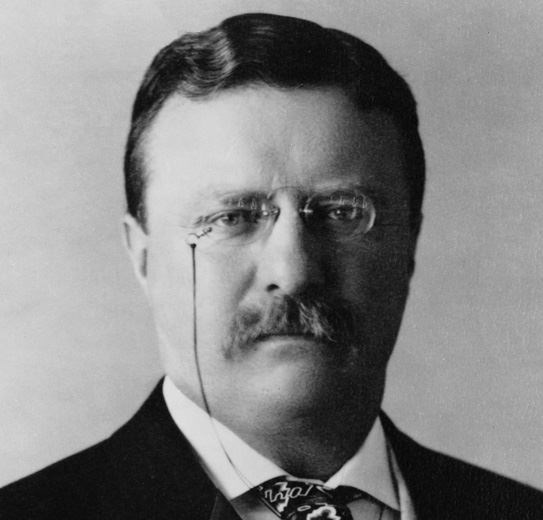 |
| Theodore Roosevelt 26th President (http://www.visitingdc.com/president/theodore-roosevelt-picture.htm) |
"Character, in the long run, is the decisive factor in the life of an individual and of nations alike" (Theodore Roosevelt). Theodore Roosevelt's quote illuminates his character and personal philosophy which greatly influenced and inspired others. In 1901, Roosevelt stood out as the youngest man ever to be sworn into office as the President of the United States. He established himself as a strong leader who greatly expanded the executive power of the United States government while directly protecting the rights and safety of the American people. Theodore Roosevelt achieved the status of a war hero from his early career as the commander of the fearless Rough Riders, the first volunteer cavalry of the United States. Roosevelt acted as a conservationist president who protected millions of acres of land and turned them into National Parks, such as the Grand Canyon. Roosevelt won the Nobel Peace Prize for ending the Russo-Japanese War. This honored him as the first American to win a Nobel Prize. Theodore Roosevelt and his accomplishments stand memorialized on the Mt. Rushmore monument and at Roosevelt's burial site at Youngs Memorial Cemetery. Theodore Roosevelt earned recognition as an amazing and heroic president of the United States because of his courage, his strong will to do what was right, and his ability to end political problems peacefully.
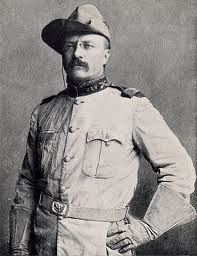 |
| Theodore Roosevelt - Rough Rider (http://blog.gallantgifts.com/business-tips/theodore-roosevelt-quote-live/) |
Roosevelt's careers as a police officer and a military commander illustrate his courageous traits as a hero. In the year 1895, Roosevelt won election by the city of New York to "serve two tumultuous years as president of the police board. Enforcing the law with relentless efficiency and uncompromising honesty, he indulged once more in acrimonious controversy with the leaders of his party. He succeeded in modernizing the force, eliminating graft from the promotion system, and raising morale to unprecedented heights" ("Theodore Roosevelt"). Roosevelt determined to turn his lazy regiment of police officers into strict law enforcers. He accomplished this by demanding strict enforcement of the law, thus setting a strong example of honor and integrity. His leadership encouraged the police force to turn away from dishonesty and become law-protecting officers as exemplified by Roosevelt himself. His actions displayed how deeply he cared about keeping people on the right path and out of harm's way. Later, Theodore Roosevelt showed he would be willing to sacrifice his own life to help the United States, when he served during the Spanish-American War: "Roosevelt was named assistant secretary of the navy; in this post he became a strong advocate for going to war against Spain in order to control Cuba, Puerto Rico, and the Philippines. When war did break out, Roosevelt insisted on resigning his post and organizing a cavalry group to fight in Cuba. Known as the Rough Riders, the regiment earned fame, and Roosevelt became a national hero by leading his men in a charge into merciless gunfire in the Battle of San Juan Hill in 1898" ("Roosevelt, Theodore"). Theodore Roosevelt courageously decided to leave his sheltered position as assistant secretary of the navy to risk his life in the battlefield to protect the United States Roosevelt advanced to command his own regiment of cavalry called the Rough Riders. Theodore Roosevelt personally joined and led troops into battle which helped the United States to win the war easily when Roosevelt claimed victory in the Battle of San Juan Hill. Roosevelt attained renown as a war hero, motivating other troops to also act bravely. Theodore Roosevelt's career as a police officer and a military hero serves as inspiration for courage and valor.
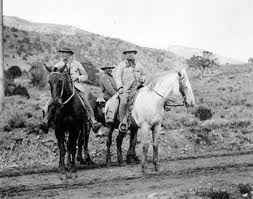 |
| Theodore Roosevelt - Conservationist (http://west.stanford.edu/cgi-bin/pager.php?id=22) |
During his presidency, Roosevelt's effective use of executive power to improve the United States emphasized his will to do what he believed was right for his country. As president, Roosevelt "used his authority to protect wildlife and public lands by... enabling the 1906 American Antiquities Act and by... protecting approximately 230,000,000 acres of public land" (Theodore Roosevelt and Conservation). Theodore Roosevelt noticed that human activity was destroying wildlife and thus decisively used his executive power to start conservation programs to save the environment in the United States. These projects, such as Yosemite National Park, have allowed people to observe and enjoy nature, influencing people to take further action to save wildlife. Also as president, Theodore Roosevelt reformed monopolies and the effects that they had on industry: Roosevelt saw things differently. He believed that in order to prosper, industrial-era businesses had to grow. But he realized that such growth gave corporations unprecedented social and economic power, and that government needed to step in to act as a counterbalance to that power." ("Roosevelt, Theodore"). Roosevelt determined that in order to protect the American people, he would need to suppress and regulate the monopolies' power. Theodore Roosevelt directed this course of action to prevent the formation of a nation where the wealthy would have more power than the poor. Roosevelt's leadership set a precedent for other presidents to follow where they could directly take control of businesses to protect the people. As president, Theodore Roosevelt expanded the power of the executive branch and motivated others to behave ethically.
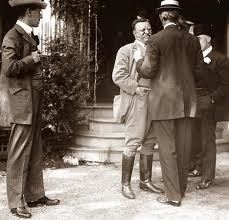 |
| Theodore Roosevelt - Diplomat (http://www.old-picture.com/american-history-1900-1930s/Roosevelt-Theodore-home-at.htm) |
Roosevelt wanted to ensure stability for the United States by reconciling conflict domestically, and by negotiating peace in different regions of the world. Theodore Roosevelt highlighted his problem-solving abilities during a 1902 winter coal mine strike in Pennsylvania: "Coal miners in Pennsylvania went on strike to demand higher wages, an eight-hour workday, and recognition of their union, the United Mine Workers of America. Eventually Roosevelt settled on a... government arbitration... Facing a potential national crisis, Roosevelt told the mine owners that he was preparing to use federal troops to seize the mines from the owners and get coal supplies flowing again" ("Roosevelt, Theodore"). Roosevelt utilized his strategy skills to formulate a course of action to keep the peace within the coal mines and to solve the problem fairly. The popular opinion favored the mine owners because they were the ones in power. However, Theodore Roosevelt recognized corruption in the mine owners and supported the mineworkers by tactically using his executive authority. Roosevelt demonstrated his resolution capabilities using fairness and wisdom, instead of yielding to popularity. Theodore Roosevelt also deployed his mediation skills in 1905 when Roosevelt helped end the Russo-Japanese War. He brought representatives of Russia and Japan together in Portsmouth, New Hampshire. Then the president served as mediator in the peace talks that led to the Treaty of Portsmouth. In 1906, Roosevelt received the Nobel Peace Prize" (Gable, John A.). Roosevelt became the first US citizen to win a Nobel Prize. Roosevelt had no direct need to help the Japanese or the Russians end their war. However, because of his protective and visionary principles, he decided to help Japan and Russia settle their differences. This action not only helped Japan and Russia, but Roosevelt's actions also prevented other countries from being dragged into a war, thus saving hundreds of lives. Theodore Roosevelt's negotiation proficiencies led to the stability of the United States and exhibited his influential personality and his good will.
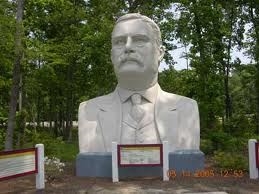 |
| Theodore Roosevelt - Hero (http://www.dahoovsplace.com/Travels/Virginia/CivilWarColonialPatriotic/Presidents%20Park/Presidents_Park.htm) |
Theodore Roosevelt served as an extraordinary president whose bravery, willpower, and abilities to resolve conflict characterize him as a remarkable leader and hero. Roosevelt's time in the military transformed him into a courageous war hero while he served his country. Theodore Roosevelt's decisive use of executive power displayed his will to do what was right for the United States. Lastly, his methods of creating peace within the United States and internationally established Roosevelt as an icon of diplomacy. Roosevelt stands as an inspiration because of his character and how he put it to work. Courage, decisiveness, and peacemaking comprise a set of noteworthy traits. Theodore Roosevelt naturally possessed these traits, but he attained status as a hero because he resolved to use his abilities to lead and to help others.
Works Cited
Gable, John A. "Roosevelt, Theodore." World Book Advanced. World Book, 2010. Web. 16 Dec. 2010.
"Roosevelt, Theodore." Industrial Revolution Reference Library. Ed. James L. Outman, Matthew May, and Elisabeth M. Outman. Vol. 2: Biographies. Detroit: UXL, 2003. 148-160. Gale Virtual Reference Library. Web. 16 Dec. 2010.
"Theodore Roosevelt." Encyclopedia of World Biography. Detroit: Gale, 1998. Gale Student Resources In Context. Web. 16 Dec. 2010.
"Theodore Roosevelt and Conservation." Theodore Roosevelt National Park. U.S. Department of the Interior, National Park Service, 28 July 2010. Web. 14 Dec 2010. http://www.nps.gov/thro/historyculture/theodore-roosevelt-and-conservation.htm.
Page created on 1/16/2011 12:00:00 AM
Last edited 1/16/2011 12:00:00 AM
